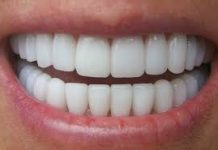Tooth implant material.
Dental implants are today a common and effective way to replace missing teeth; this technology has proved to be healthy for the jawbone and the appearance of the mouth since it prevents the loss of the bone that usually occurs when a tooth is missing. It allows patients to act as they have their natural teeth back again.
Dental implants procedure has been continuously developed, and now, with so-called All-on-4 and All-on-6 dental implants, edentulous patients can obtain a full denture with only 4 or 6 implants per arch, thus avoiding the traditional dentures.
As important as the technique, materials constitute another issue on which researchers and dentists are debating.
A dental implant is usually made of two parts, a screw that is inserted into the bone, and an abutment, that is lately attached to the screw, and that is the support for the prosthesis.
Because it is inserted into the bone, the implant is made of a bio-compatible material, not harmful for the body, which fuses into the bone and becomes a part of it.
Titanium implants.
Traditionally, this material is a titanium alloy, a metal alloy that is still used after decades with 98% of successful treatments.
Nowadays, another kind of material has been studied and employed, and that is zirconium, or zirconium oxide; used in dentistry combined with other materials, zirconium is a transitional metal. Zirconium used in dentistry is labelled as a ceramic.
Zirconium is usually employed to create crowns and bridges, it has the same colour of the teeth, is high resistant to corrosion, and it fuses into the bone much like titanium.
Dental implants made up of zirconium are doing well in dentistry, because of their aesthetical properties and some implants can be made up of titanium covered with zirconium.
Zirconia implants.
Zirconium might seem to be better than titanium, but titanium is used for decades, and the results of its use are evident; it is durable, it does not seem to cause side effects and, according to dentists, titanium implants are more versatile with the final teeth and flexible with their surgical placement. Anyway, like any other metal, titanium might suffer from corrosion.
Since they are constituted by a single piece, screw and abutment together, the zirconium implants are less versatile, and the step of osseointegration seems to be most at risk; moreover, zirconium is reported to fracture.
Dental implant materials.
A dental implant is a technique very sensitive and important for the patient’s health, as well as expensive; each material has its advantages and disadvantages, and the patient should discuss with the dentist and make an informed choice on the type of implant.





